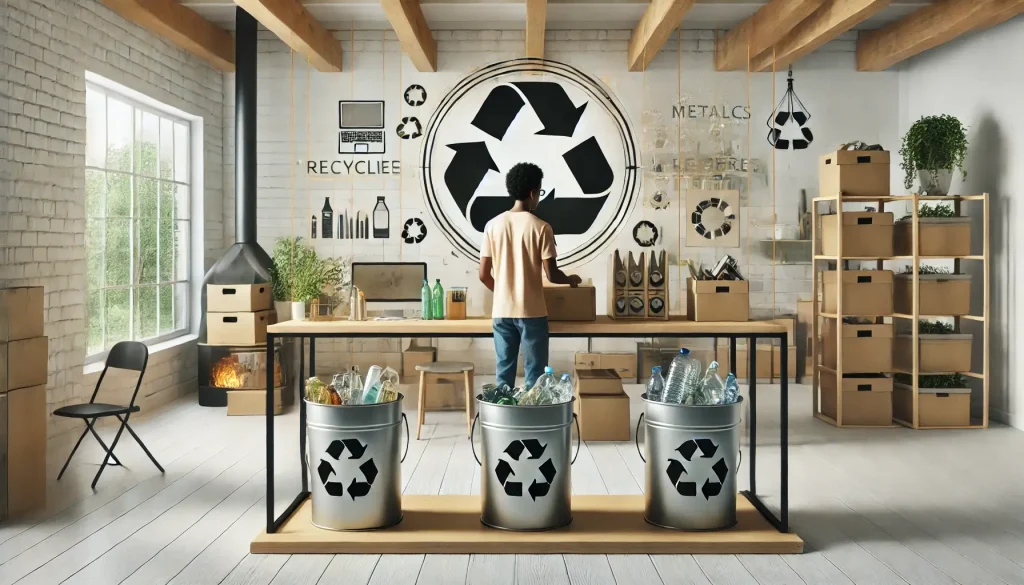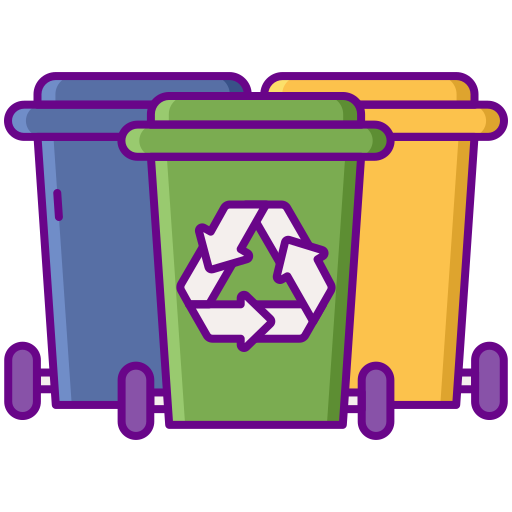In der sich schnell entwickelnden Welt von heute sind nachhaltige Praktiken nicht mehr optional - sie sind unerlässlich. Umarmung erneuerbar Ansätze für das Recycling stehen an der Spitze des Aufbaus einer Kreislaufwirtschaft, in der Abfall kein Endpunkt, sondern eine Ressource ist. In diesem umfassenden Leitfaden wird untersucht, wie Recycling als erneuerbarer Prozess die Kreislaufwirtschaft vorantreibt, Ressourcen schont und branchenübergreifend Innovationen fördert.

Index
Die Kreislaufwirtschaft verstehen
Die Kreislaufwirtschaft stellt ein transformatives Modell dar, das das traditionelle lineare "Nehmen-Herstellen-Entsorgen"-System durch ein System ersetzt, das von vornherein regenerativ ist. Dieses Modell legt den Schwerpunkt auf die kontinuierliche Wiederverwendung von Ressourcen und die Minimierung von Abfall und Umweltauswirkungen.
Schlüsselprinzipien einer Kreislaufwirtschaft
- Ressourceneffizienz: Die Produkte sind auf Langlebigkeit, Reparatur und eventuelles Recycling ausgelegt, um sicherzustellen, dass die Rohstoffe optimal genutzt werden.
- Abfallvermeidung: Jede Phase des Produktionsprozesses zielt darauf ab, Abfälle zu vermeiden und Nebenprodukte wieder in den Produktionszyklus zu integrieren.
- Nachhaltige Produktion: Die Kreislaufwirtschaft fördert die Verwendung erneuerbarer Ressourcen und umweltfreundlicher Verfahren und verringert die Abhängigkeit von endlichen Materialien.
- Wirtschaftliche Resilienz: Durch die Schaffung geschlossener Kreisläufe können Unternehmen Kosten senken, Innovationen fördern und widerstandsfähigere Lieferketten aufbauen.
Die Rolle von erneuerbarem Recycling
Erneuerbares Recycling ist ein entscheidendes Element der Kreislaufwirtschaft. Es wandelt weggeworfene Materialien in wertvolle Ressourcen um und sorgt dafür, dass die Materialien kontinuierlich in den Wirtschaftskreislauf zurückgeführt werden. Dieser Prozess schont nicht nur die Ressourcen, sondern fördert auch technologische Innovationen und Marktwachstum.
Erneuerbares Recycling: Ein nachhaltiger Ansatz
Erneuerbar Recycling nutzt moderne Technologien und innovative Verfahren, um Abfall in neue Materialien umzuwandeln. Bei diesem Ansatz geht es nicht nur um die Reduzierung von Abfällen, sondern auch um die Schaffung eines erneuerbaren Ressourcenflusses, der die langfristige Nachhaltigkeit unterstützt.
Technologische Innovationen im Bereich erneuerbares Recycling
- Fortschrittliche Sortier- und Rückgewinnungssysteme:
- IoT-Sensoren und Datenanalyse: Intelligente Sensoren überwachen Recyclingbehälter und Verarbeitungsanlagen in Echtzeit und ermöglichen so eine effiziente Materialsortierung und Abfallverwaltung. Dieser datengesteuerte Ansatz verbessert die Materialrückgewinnung und minimiert die Verschmutzung.
- Automatisierte Robotersortierung: Roboter und KI-gesteuerte Systeme trennen die verschiedenen Arten von Wertstoffen genau und sorgen dafür, dass wertvolle Materialien erhalten bleiben und effizient verarbeitet werden.
- Chemische und mechanische Recycling-Verfahren:
- Chemisches Recycling: Innovative chemische Verfahren zerlegen Kunststoffe in ihre ursprünglichen Monomere und ermöglichen so die Herstellung hochwertiger, erneuerbarer Materialien, die es mit Neuprodukten aufnehmen können.
- Mechanisches Recycling: Traditionelle mechanische Verfahren ermöglichen, wenn sie mit moderner Technologie optimiert werden, die effiziente Wiederaufbereitung von Materialien wie Papier, Metallen und Glas und verwandeln sie mit minimalem Energieaufwand in neue Produkte.
- Digitale Integration und Blockchain-Technologie:
- Digitales Tracking: Moderne digitale Tools ermöglichen eine transparente Verfolgung der Materialien von der Sammlung bis zur Verarbeitung und stellen sicher, dass jeder Schritt im Recyclingprozess umweltfreundlichen Standards entspricht.
- Blockchain für Transparenz: Die Blockchain-Technologie schafft ein überprüfbares Hauptbuch für Recyclingprozesse, schafft Vertrauen bei den Verbrauchern und ermutigt Unternehmen, sich an die Standards für erneuerbare Energien zu halten.
Design für Erneuerbarkeit
Bei der Entwicklung von Produkten, die auf Erneuerbarkeit ausgelegt sind, muss der gesamte Lebenszyklus eines Produkts berücksichtigt werden. Dazu gehört, dass das Produkt so konstruiert wird, dass es sich leicht demontieren, reparieren und recyceln lässt, damit die Materialien auf unbestimmte Zeit wiederverwendet werden können.
- Neugestaltung des Produkts: Die Ingenieure konzentrieren sich jetzt auf die Herstellung von Produkten, die leichter zu recyceln sind. Durch diese Umgestaltung wird sichergestellt, dass jedes Bauteil effizient wiedergewonnen und in den Produktionskreislauf zurückgeführt werden kann.
- Modularer Aufbau: Bei modularen Produkten können einzelne Komponenten ausgetauscht oder aufgerüstet werden, ohne dass das gesamte Produkt entsorgt werden muss, was seine Lebensdauer erheblich verlängert und die Abfallmenge verringert.
- Umweltverträgliche Materialien: Die Einbeziehung von erneuerbaren und recycelten Materialien in neue Produkte stärkt die Kreislaufwirtschaft und verringert die Abhängigkeit von nicht erneuerbaren Ressourcen.
Ökologische Vorteile von erneuerbarem Recycling
Die Einführung erneuerbarer Recyclingverfahren bringt weitreichende Umweltvorteile mit sich, die für die langfristige Nachhaltigkeit entscheidend sind.
Abfallvermeidung und Ressourcenschonung
- Geringerer Deponieverbrauch: Durch die Umwandlung von Abfällen in neue Materialien verringert das erneuerbare Recycling die Abfallmenge, die auf Deponien landet, und schont so den Boden und verhindert die Umweltverschmutzung.
- Bewahrung der natürlichen Ressourcen: Durch das Recycling wird der Bedarf an der Gewinnung neuer Rohstoffe verringert, wodurch endliche natürliche Ressourcen wie Mineralien, Wasser und fossile Brennstoffe geschont werden.
- Energieeinsparungen: Recyclingprozesse benötigen in der Regel weniger Energie als die Herstellung neuer Produkte aus neuen Materialien, was zu geringeren Treibhausgasemissionen und einer reduzierten CO2-Bilanz führt.
Förderung der biologischen Vielfalt und der Gesundheit der Ökosysteme
- Minimierung ökologischer Beeinträchtigungen: Weniger Rohstoffabbau bedeutet weniger Eingriffe in die natürlichen Lebensräume, den Schutz der Ökosysteme und die Erhaltung der Artenvielfalt.
- Wasser- und Luftqualität: Eine verringerte industrielle Tätigkeit und geringere Emissionen tragen zur Verbesserung der Wasser- und Luftqualität bei, was sowohl der Umwelt als auch der öffentlichen Gesundheit zugute kommt.
Wirtschaftliche Vorteile einer erneuerbaren Kreislaufwirtschaft
Die Umstellung auf erneuerbares Recycling im Rahmen einer Kreislaufwirtschaft kommt nicht nur der Umwelt zugute, sondern bietet auch erhebliche wirtschaftliche Vorteile.
Kosteneffizienz und wirtschaftliche Widerstandsfähigkeit
- Niedrigere Produktionskosten: Die Verwendung von recycelten Materialien senkt in der Regel die Produktionskosten, da recycelte Rohstoffe oft billiger sind als neue Materialien.
- Erhöhte Produktlebensdauer: Produkte, die auf Erneuerbarkeit und Modularität ausgelegt sind, können einen längeren Lebenszyklus haben, was die Ersatzkosten senkt und die wirtschaftliche Widerstandsfähigkeit erhöht.
- Marktwachstum: Die erneuerbare Recyclingindustrie schafft neue Märkte und Beschäftigungsmöglichkeiten in den Bereichen Recycling, Wiederaufbereitung und nachhaltiges Produktdesign und fördert so das Wirtschaftswachstum.
Innovation und Wettbewerbsvorteil
- Technologische Innovation: Investitionen in erneuerbare Recyclingtechnologien fördern Innovationen, die zu effizienteren Verfahren und hochwertigeren Recyclingprodukten führen.
- Nachhaltiges Branding: Unternehmen, die sich für erneuerbare Energien einsetzen, können sich auf dem Markt differenzieren, umweltbewusste Verbraucher ansprechen und die Markentreue stärken.
- Risikominderung: Die Diversifizierung der Lieferketten durch die Einbeziehung von Recyclingmaterialien trägt dazu bei, die mit Rohstoffknappheit und Preisschwankungen verbundenen Risiken zu mindern.
Soziale Auswirkungen und gesellschaftliches Engagement
Neben den ökologischen und wirtschaftlichen Vorteilen spielt das Recycling erneuerbarer Energien eine wichtige Rolle bei der Förderung des gesellschaftlichen Engagements und der sozialen Verantwortung.
Auswirkungen auf Bildung und Kultur
- Das Bewusstsein schärfen: Durch Aufklärungsprogramme über erneuerbare Recyclingpraktiken werden Gemeinden zu nachhaltigem Verhalten ermutigt, was zu verantwortungsbewussteren Konsumentscheidungen führt.
- Kulturelle Bewahrung: Durch die Förderung des Recyclings und der Wiederverwendung von Materialien können Gemeinden kulturelle Artefakte und traditionelle Praktiken bewahren und sie mit moderner Technologie verbinden.
Recycling-Initiativen auf Gemeindeebene
- Lokale Recycling-Drehscheiben: Die Einrichtung kommunaler Recyclingzentren erleichtert den Zugang zum Recycling und fördert die lokale Beteiligung. Diese Zentren dienen auch als Zentren für Innovation und Bildung.
- Anreiz-Programme: Belohnungssysteme und gemeinschaftliche Herausforderungen können den Einzelnen motivieren, sich an Recyclingaktivitäten zu beteiligen und nachhaltige Praktiken zu einer kollektiven Anstrengung zu machen.
- Öffentlich-private Partnerschaften: Die Zusammenarbeit zwischen lokalen Behörden, Unternehmen und kommunalen Organisationen trägt zum Aufbau einer soliden Recycling-Infrastruktur bei, von der alle profitieren.
Zukünftige Wege für erneuerbares Recycling
Die Zukunft des erneuerbaren Recyclings steht vor spannenden Fortschritten, die den Ressourcenschutz und die nachhaltige Produktion weiter verbessern werden.
Aufkommende Technologien und Innovationen
- KI der nächsten Generation und IoT: Die kontinuierlichen Fortschritte bei der künstlichen Intelligenz und dem Internet der Dinge werden die Effizienz der Abfallwirtschaft weiter steigern und eine präzisere Materialsortierung und Echtzeitüberwachung ermöglichen.
- Innovative chemische Prozesse: Durchbrüche bei den chemischen Recyclingtechnologien werden es ermöglichen, auch komplexe Materialien zu verarbeiten, wodurch die Palette der recycelbaren Produkte erweitert wird.
- Fortgeschrittene Materialwissenschaft: Die Forschung auf dem Gebiet der biologisch abbaubaren und biobasierten Materialien wird neue umweltfreundliche Alternativen hervorbringen, die die herkömmlichen recycelten Materialien ergänzen und die Umweltbelastung weiter verringern.
Globale Zusammenarbeit und politische Entwicklung
- Internationale Normen: Die Entwicklung globaler Recyclingstandards wird die Praktiken grenzüberschreitend harmonisieren und sicherstellen, dass erneuerbares Recycling zu einem Eckpfeiler der globalen Nachhaltigkeitsbemühungen wird.
- Staatliche Anreize: Verbesserte politische Maßnahmen und finanzielle Anreize werden Unternehmen dazu ermutigen, in erneuerbare Recyclingtechnologien zu investieren und sie in ihre Lieferketten zu integrieren.
- Verbrauchergesteuerter Wandel: In dem Maße, wie das Bewusstsein für nachhaltige Praktiken wächst, werden die Verbraucher zunehmend Produkte aus recycelten Materialien nachfragen, was weitere Innovationen und Marktexpansion fördert.
Fallstudien: Erneuerbares Recycling in Aktion
Beispiele aus der Praxis zeigen die transformative Kraft des erneuerbaren Recyclings bei der Schaffung einer nachhaltigen Zukunft.
Fallstudie 1: Urban Smart Recycling Initiative
Eine große Großstadt integrierte IoT-Sensoren und KI-gesteuerte Sortiersysteme in ihr Recyclingprogramm. Die Initiative führte zu einer Steigerung der Recyclingeffizienz um 40%, wodurch die Abfallmenge erheblich reduziert und der gesamte CO2-Fußabdruck der Stadt verringert werden konnte. Dieses intelligente Recyclingprogramm ist ein Beispiel dafür, wie erneuerbare Technologien die städtische Abfallwirtschaft verändern können.
Fallstudie 2: Closed-Loop-Fertigung in der Elektronik
Ein führender Elektronikhersteller hat seinen Produktionsprozess umgestaltet, um recycelte Komponenten in einem geschlossenen Kreislaufsystem zu verwenden. Durch die Wiederverwendung von Materialien aus ausrangierten Geräten verringerte das Unternehmen seine Abhängigkeit von neuen Rohstoffen um 60%, was sowohl wirtschaftliche als auch ökologische Vorteile mit sich bringt und die Innovation im Bereich des erneuerbaren Recyclings vorantreibt.
Fallstudie 3: Kommunales Recyclingzentrum
In einem Vorort wurde ein von der Gemeinde betriebenes Recyclingzentrum eingerichtet, um die Bewohner aufzuklären und die lokalen Recyclingmaßnahmen zu rationalisieren. Das Zentrum steigerte die lokale Beteiligung und sorgte dafür, dass erhebliche Abfallmengen nicht mehr auf Deponien abgelagert werden mussten. Diese Initiative verbesserte nicht nur die Umweltergebnisse, sondern stärkte auch den Zusammenhalt der Gemeinschaft und förderte ein nachhaltiges Leben.
Schlussfolgerung: Umarmung einer erneuerbaren Zukunft
Bei der Maximierung der Umweltvorteile durch erneuerbares Recycling geht es nicht nur um die Reduzierung von Abfällen, sondern auch um den Aufbau einer widerstandsfähigen Kreislaufwirtschaft, die unsere natürlichen Ressourcen schont und das langfristige ökologische Gleichgewicht fördert. Jeder weggeworfene Gegenstand birgt das Potenzial für eine Umgestaltung. Wenn wir die Art und Weise, wie wir Materialien konsumieren, produzieren und entsorgen, überdenken, können wir neue Möglichkeiten zur Abfallreduzierung, Energieeinsparung und zum Wirtschaftswachstum erschließen.
Ein wirklich effektives Recyclingsystem erfordert einen vielschichtigen Ansatz. Dazu gehören Investitionen in hochmoderne Recyclingtechnologien, politische Anreize und eine breite Sensibilisierung der Verbraucher. Durch den Einsatz von KI-gestützten Sortiersystemen, Fortschritten beim chemischen Recycling und biologisch abbaubaren Alternativen kann die Industrie die Effizienz und Effektivität der Materialrückgewinnung erheblich verbessern. Darüber hinaus sorgen strengere rechtliche Rahmenbedingungen und Initiativen zur Unternehmensverantwortung dafür, dass Unternehmen die Recyclingfähigkeit in ihre Produktgestaltung integrieren und so den Lebenszyklus wertvoller Ressourcen verlängern.
Auch das Engagement der Gemeinschaft spielt eine wichtige Rolle bei der Gestaltung einer Zukunft, in der Recycling nicht nur ein nachträglicher Gedanke, sondern eine grundlegende Säule der Umweltverantwortung ist. Bildungsprogramme, Basisbewegungen und Recyclinginitiativen, die auf Belohnungen basieren, befähigen den Einzelnen, proaktive Schritte zur Verringerung seines ökologischen Fußabdrucks zu unternehmen. Durch die Förderung eines kollektiven Umweltbewusstseins können wir die Abfallwirtschaft in ein System verwandeln, das sowohl den Menschen als auch dem Planeten zugute kommt.
Unter Eu SetorWir engagieren uns für bahnbrechende grüne Praktiken, die die Kraft des erneuerbaren Recyclings nutzen, um Abfall in wertvolle Ressourcen umzuwandeln. Unsere Aufgabe ist es, die Lücke zwischen Innovation und praktischer Anwendung zu schließen und sicherzustellen, dass nachhaltige Lösungen für Unternehmen, Gemeinden und Einzelpersonen gleichermaßen zugänglich werden. Durch Forschung, Lobbyarbeit und strategische Partnerschaften wollen wir die breite Einführung verantwortungsvoller Abfallbewirtschaftungspraktiken fördern, die zu einer saubereren und gesünderen Welt führen.
Wir laden Sie ein, sich mit uns für diese umweltbewussten Praktiken einzusetzen und das transformative Potenzial des erneuerbaren Recyclings zu erkunden. Jede noch so kleine Maßnahme trägt zu einer größeren Bewegung für eine abfallfreie Zukunft bei.
Weitere Einblicke, detaillierte Leitfäden und Anregungen, wie Sie erneuerbares Recycling in Ihr tägliches Leben und Ihre Geschäftsabläufe integrieren können, finden Sie auf unserer Website unter eu.setorreciclagem.com.br und werden Sie Teil der Eu Setor Gemeinschaft. Lassen Sie uns gemeinsam eine Zukunft anstreben, in der Innovation und ökologische Verantwortung den Fortschritt vorantreiben - eine Zukunft, in der jedes Material ein neues Leben erhält, Abfälle minimiert werden und unser Planet für kommende Generationen erhalten bleibt.
